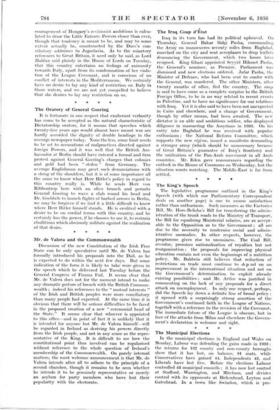The King's Speech
The legislative programme outlined in the King's Speech (with which our Parliamentary Correspondent deals on another page) is one to arouse satisfaction rather than enthusiasm. Such measures as the Factories Bill, Mr. Hore-Belisha's Bill for transferring the admin- istration of the trunk roads to the Ministry of Transport, the Bill for equalising Ministerial salaries, are as accept- able to the Opposition as to the Government ; all are due to the necessity to modernise social and admin- istrative anomalies. In other respects, however, the programme gives rise to uneasiness. The Coal Bill, overdue, promises nationalisation of royalties but not reorganisation ; the proposals for improving physical education contain not even the beginnings of a nutrition policy. Mr. Baldwin still believes that reduction of restrictions on trade must continue to do p2nd on an improvement in the international situation and not on the Government's determination to exploit already existing possibilities ; and Mr. Attlee was justified in commenting on the lack of any proposals for a direct attack on unemployment. In only one respect, perhaps, did the Speech lay down a definite line of broad policy : it opened with a surprisingly strong assertion of the Government's continued faith in the League of Nations, together with a reference to the revision of the Covenant. The immediate future of the League is obscure, but in face of the attacks from Milan and elsewhere the Govern- ment's declaration is welcome and right.
* * * *














































 Previous page
Previous page